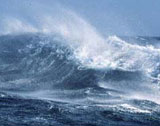 The world's oceans are slowly getting more acidic, say scientists. The world's oceans are slowly getting more acidic, say scientists.
The researchers from California say the change is taking place in response to higher levels of carbon dioxide in the atmosphere. The lowering of the waters' pH value is not great at the moment but could pose a serious threat to current marine life if it continues, they warn. Ken Caldeira and Michael Wickett, from the Lawrence Livermore National Laboratory, report their concerns in the journal Nature. Increasing use of fossil fuels means more carbon dioxide is going into the air, and most of it will eventually be absorbed by seawater. Once in the water, it reacts to form carbonic acid. Scientists believe that the oceans have already become slightly more acidic over the last century. But these researchers have tried to predict what will happen in the future by combining what we know about the history of the oceans with computer models of climate change. "This level of acidity will get much more extreme in the future if we continue releasing CO2 into the atmosphere," said Dr Caldeira. "And we predicted amounts of future acidity that exceed anything we saw over the last several hundred million years, apart from perhaps after rare catastrophic events such as asteroid impacts." If carbon dioxide release continues unabated, ocean pH could be reduced by as much as 0.77 units, the authors warn. It is not absolutely clear what that means for marine life, however. Most organisms live near the surface, where the greatest pH change would be expected to occur, but deep-ocean lifeforms may be more sensitive to pH changes. Coral reefs and other organisms whose skeletons or shells contain calcium carbonate may be particularly affected, the team speculate. They could find it much more difficult to build these structures in water with a lower pH. In recent years some people have suggested deliberately storing carbon dioxide from power stations in the deep ocean as a way of curbing global warming. But Dr Caldeira said that such a strategy should now be re-considered. "Previously, most experts had looked at ocean absorption of carbon dioxide as a good thing - because in releasing CO2 into the atmosphere we warm the planet; and when CO2 is absorbed by the ocean, it reduces the amount of greenhouse warming. (Agencies) | 科學家們說世界上的海洋正在慢慢變“酸”。 來自加利福尼亞的研究人員稱這種變化是由于大氣中二氧化碳含量過高造成的。 他們警告說,目前海水pH值下降還不是非常嚴重,但是如果繼續(xù)下降的話會對現(xiàn)存的海洋生物造成嚴重的威脅。 來自美國羅蘭士利弗摩亞國家實驗室的肯·卡爾代羅和邁克爾·維克特在《自然》雜志上提出了他們對此事的關注。 越來越多的石油消耗意味著更多的二氧化碳被排放到空氣中,而且大部分最終將被海水吸收。二氧化碳一旦進入水中,就會發(fā)生反應形成碳酸。 科學家們認為海洋的酸性已經比上個世紀稍微大了一點。 這些研究者們結合所知的海洋歷史以及氣候變化的電腦模型,試圖預測將來的變化。 “如果我們繼續(xù)向大氣中排放二氧化碳的話,將來的酸性濃度會遠遠超標。”卡爾代羅博士說。 “而且我們估計將來酸的總量會比過去幾億年中人類所見到的任何東西都大,更不用說可能發(fā)生類似小行星撞擊地球等罕見的大災難之后了。” 研究者們警告說,如果不減少二氧化碳的排放量,海洋的pH值可能會降低0.77個單位。 盡管這對海洋生命來說意味著什么還不是很清楚。 大多數(shù)生物生活在海洋表面,而海洋表面正是pH值預期變化最大的地方,但是深海生物可能對pH值的變化更加敏感。 研究組推測,珊瑚礁和其它骨架或外殼中含有碳酸鈣的生物受到的影響可能會格外明顯,在pH值較低的水域中它們很難形成這些結構。 最近的幾年中,有人蓄意建議將發(fā)電站釋放的二氧化碳儲藏到深海中,以此來抑制全球變暖。 但是卡爾代羅博士說現(xiàn)在應該重新考慮這種策略。 “以前,大多數(shù)專家都將海洋吸收二氧化碳看作一件好事——因為將二氧化碳釋放到大氣中會使大氣變暖,然而當二氧化碳被海洋吸收后,溫室效應就會降低。” (中國日報網(wǎng)站譯) |
